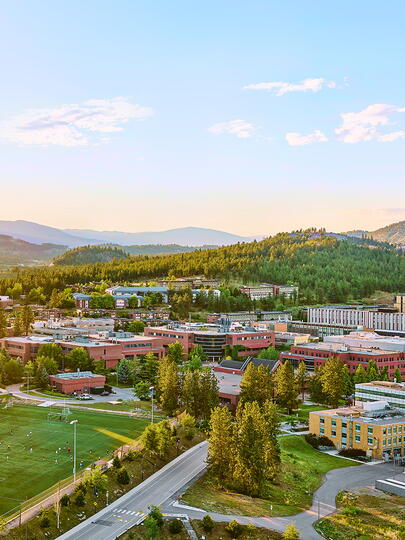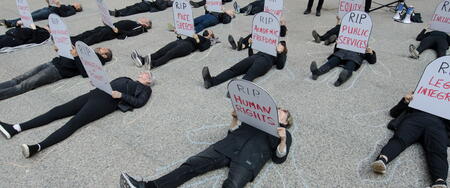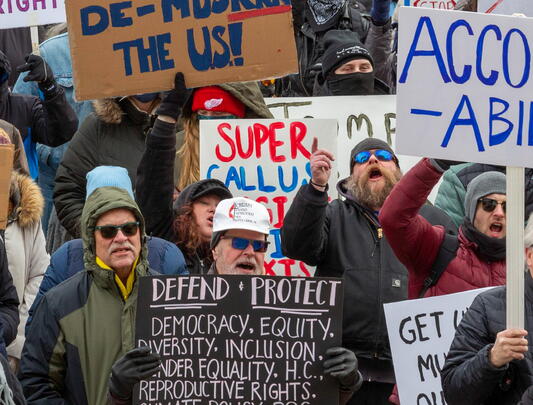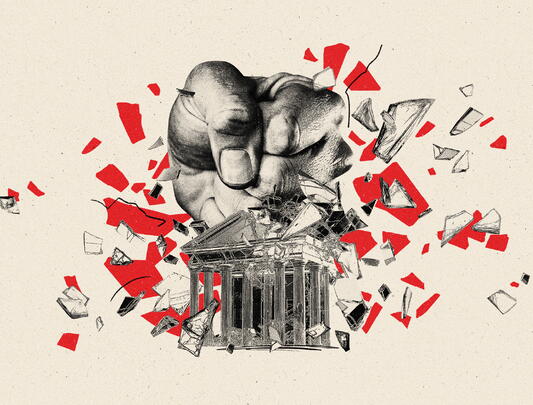
Luxury yachts in Monaco. (Photographer: Jeremy Suyker/Bloomberg via Getty Images)
Why the rich are getting richer
And how a widening wealth gap is damaging democracy.
Does a rising tide really lift all boats?
Well, technically, yes. Which is great if you happen to live on a boat.
The phrase made sense when John F. Kennedy famously said it in 1962. The richest Americans paid a federal* tax rate of 91 per cent on their highest earnings, and top CEOs were paid 21 times as much as the average labourer. The success of the few buoyed the necessities of the many.
Today, America’s highest federal tax rate tops out at 37 per cent, and the CEO-to-worker wage gap has ballooned to 290-1. Canada has fared little better, currently taxing the top earners at 33 per cent and sporting a wage gap of 210-1. So while the rising tide might have lifted all yachts, if you are part of the growing demographic that barely earns a living wage, you might know what it feels like to tread water.
“The story of the last few decades has not been one, for the most part, of rising poverty,” says Alan Jacobs, head of the Department of Political Science at UBC. “Rather, it’s been a story of rising concentrations of income and wealth at the very top. It is the very rich who have been pulling away from everybody else, essentially, in terms of their share of resources.”
Indeed, poverty rates in the US and Canada have remained steady or fallen slightly since 2000. But over the same period, the income gap between working stiff and executive suit has grown dramatically – an outsized disparity that not only polarizes the economic landscape, but also the democratic structures we rely on.
“Economic inequality is itself a creature of politics, but it also feeds back into politics and into the functioning of democracy,” says Jacobs. “One way in which it can do that is by diminishing citizens’ trust in government and their sense of belonging to the social collective. There is quite a bit of evidence that rising inequality is associated with declining trust in government, and declining satisfaction with democracy. It gives those who are on the losing end the sense that democracy just isn’t really working for them.”
The Growing Divide
Part of the economic gap arises not from differences in nominal salaries but in wage-adjacent extras like massive bonuses and stock options that skirt the tax code and drain the coffers. Once based on job performance, formerly routine perks for executives have become eye-popping packages, such as the $47 billion in stock that Tesla shareholders awarded to Elon Musk in 2024 – more than half the company’s total income that year.
“It seems like something’s broken down in that chain of accountability from shareholders to boards, such that boards tend to be rubber stamping ever-larger pay packages that often are not closely tied to performance,” says Jacobs. “So there have been ways to pay senior executives more and more, made easier by lax oversight by both boards and governments.”
On the other end of the scale, lower- and middle-class jobs have taken hits from automation, offshoring jobs, and declining union membership. The federal minimum wage in the US – once a benchmark of fair pay for low-skilled workers – has not risen since 2007. Nearly 80 million US workers work hourly jobs, many of them more than one.
“We see a hollowing out of the occupational categories that would have generated decent and, over time, rising incomes in the middle,” adds Jacobs. “But the overall compensation that lower- and middle-income workers receive is the outcome of a struggle between the owners of capital and labour. In any company, there’s a certain amount of revenue to be distributed. Some of that is going to go to pay the workers, and some of it’s going to be returned to the owners. Unions, traditionally, were a really important source of leverage and bargaining power for workers. And so, if unions are collapsing, that gives capital a much stronger hand and makes it much easier for them to hold wages and salaries down.”
The rise of income inequality feeds the cycle of wealth inequality; outsized compensation packages for executives provide the capital for the accumulation of assets – stocks, property, company ownership, inheritance – that generate more wealth without more labour. The gap widens considerably because wealth generates more wealth, while those at the bottom struggle just to make it through the week.
Voting for Change
But we are talking about democracies. Those who have too little vastly outnumber those who have too much, so why don’t we see citizens voting for people who offer more equitable redistribution – higher taxes on the very rich and forms of government spending that would improve the material welfare of everyone else? Why do so many people vote against their economic interests?
“Across Western democracies, we see lower- and middle-income voters behaving in exactly the opposite way that you might expect at election time,” says Jacobs. “We might expect to see governments that have overseen rising inequality get punished by the lower- and middle-income voters who are losing out. Instead, they vote at higher rates for governing parties that oversee periods of rising inequality. We expect people at the ballot box to be thinking about their own economic interests to some degree, but it doesn’t appear that most voters are very good at doing that.”
The problem, then, is one of information. How do voters know whether the economy is serving their interests? How is economic performance being defined for them? What counts as a good economy or a bad economy for the individual voter?
Jacobs and his colleagues have tackled these questions by looking at the influence that news media play in shaping citizens’ economic perceptions. Analyzing more than a million articles about the economy from the largest circulation US newspapers, they tracked over time whether the news media were reporting good economic news or bad economic news, and overlaid that with what was actually happening for different income groups – the very poor, the middle class, and the very rich.
“What we found is that the tone of the economic news – that positivity or negativity – is highly correlated with the fortunes of the very rich – whether they are having a good year or a good quarter,” says Jacobs. “There’s very little connection to the economic gains and losses being experienced by everyone below the 95th percentile.”
In other words, voters cast their ballots based on a judgment shaped by a news media that’s telling them the government did a great job on the economy when the rich have been doing better than everyone else, and that the government has mishandled the economy when the poor are closing the gap.
Essentially, journalists aren’t considering questions of distribution – instead treating the economy as an aggregate whole that’s either booming or falling into recession. They’re not thinking about who is getting what.
“Functioning democracy requires a well-informed citizenry,” says Jacobs. “If the news media are not providing the basic information citizens need to figure out a question like ‘is this policy going to be good or bad for me,’ then citizens are not going to be able to play the role that democracy or democratic theory assigns to them.”
What follows is a domino effect: skewed economic reporting begets citizens voting against their interests, which empowers leaders to enact policies that favour the wealthy, thus widening the wealth gap and disenfranchising voters who are losing ground and struggling more every day.
“That can lead to not just distrust,” says Jacobs, “but a sense of inefficacy – to citizens wondering ‘Why should I bother taking part in politics if my voice, my preferences, my interests just don’t count?’ And that leads to a reduced sense of investment in community, which is going to lead to disengagement and probably dissatisfaction with the political system – with democracy. Citizens need to be informed about which policies are contributing to rising inequality or contributing to the stagnation of incomes, and they need to be drawing a line from those policies to the decision makers, because it’s only with that information that citizens are equipped to
hold governments accountable.”
* This feature was edited on September 25, 2025, to clarify that the writer is referring to the federal tax rate alone, and not provincial or state tax.



































